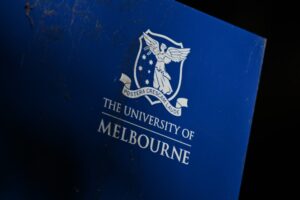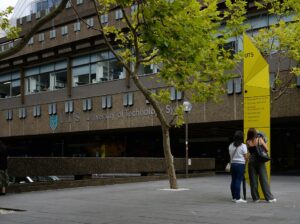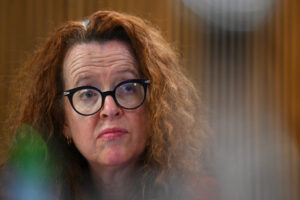You can’t be a leader if you follow people down the wrong path, which is why, with a heavy heart, I am returning the alumni award for National Leadership the University of Newcastle bestowed on me in 2017.
I cannot understand how the council of a university whose motto is “I look ahead” could appoint a chancellor who is not just the chair of a coal company, but the same coal company that just argued in a court case that we have no obligation to future generations when approving coal mines.
I have no personal grievance with Mark Vaile.

In a free country, he was free to express scepticism about climate science as deputy prime minister. And after leaving politics he was free to chair coal companies.
But while I couldn’t renounce my citizenship or sell shares in his coal companies to register my displeasure, or hand back the knowledge I gained from my economics degree of his new university, I can hand back my Alumni of the Year Award.
The world is at a turning point in the battle to prevent climate change.
US President Joe Biden has made clear he will make tackling climate change not just his number one domestic objective, but the focus of the world’s attention.
No region on earth has more to lose from the world’s shift away from coal than here. And in turn, no region on earth has more to gain from effectively planning the further diversification of its economy.
But despite the good work of many at the University of Newcastle, its council has decided now is the time to align itself with the coal industry.
Such symbolic support for fossil fuels won’t protect jobs, but it will harm the university’s reputation in the eyes of the community and its future students.
It’s the climate policies of the US, China, Japan and Korea that will determine how much coal is exported through the Port of Newcastle, not local “faith” in the industry.
While decisions made in the Hunter have no impact on the world’s demand for coal, decisions made in the Hunter, and in Sydney, will entirely determine whether the region can successfully diversify its economy in time.
No one else in the world cares if the Hunter manages this transition or not, so I can’t imagine how that transition isn’t at the heart of everything the University of Newcastle does.
Which brings me back to the appointment of Vaile as chancellor.
In September 2020, a group of eight school students filed a class action lawsuit on behalf of all Australian children. They were seeking to prevent the federal Environment Minister from approving an expansion of a coal project proposed by Vaile’s company, Whitehaven Coal.
The schoolkids argued that the Environment Minister had a “duty to protect young people from the devastating impacts of climate change”.
Whitehaven argued against the duty, saying that the mine would not harm children.
Thankfully, the Judge disagreed with Vaile’s company, finding that the mine’s emissions will increase the risk of tipping points that can lead to catastrophic harm.
The Judge found:
“It is difficult to characterise in a single phrase the devastation that the plausible evidence presented in this proceeding forecasts for the children … Lives will be cut short. Trauma will be far more common and good health harder to hold and maintain.
“None of this will be the fault of nature itself.
“It will largely be inflicted by the inaction of this generation of adults, in what might fairly be described as the greatest intergenerational injustice ever inflicted by one generation of humans upon the next.”
While the court did not issue the injunction sought, it did find that the Environment Minister has a duty not to cause harms linked to climate change when approving the coal project.
However, despite this landmark finding, Vaile’s company said after the judgement that “our consistent position has been that this legal claim was without merit.
“The company sees a continuing role for high quality coal in contributing to global CO2 emissions reduction efforts.”
While he was deputy prime minister, Vaile expressed doubt over the science of climate change.
If he has renounced this scepticism, it is hard to see how he could now take the science of climate change seriously while leading a company that argues burning more coal contributes to global efforts to lower CO2 emissions.
And if he hasn’t renounced those views it is even harder to see how an academic institution could appoint him to its most senior governance position.
If the University of Newcastle wants to attract and develop the leaders of tomorrow, it must show clear leadership itself.
It’s not too late for the University Council to reconsider its decision, but it will soon be too late for the University of Newcastle to put the interests of their future students first.
Back in the 1980s my university taught me to look ahead.
I hope the University Council still knows how.
Dr Richard Denniss is an alumnus of the University of Newcastle and chief economist at independent think-tank The Australia Institute.
Between the Lines Newsletter
The biggest stories and the best analysis from the team at the Australia Institute, delivered to your inbox every fortnight.
You might also like
“Out of control” Vice-Chancellor pay must be reined in – submission.
It’s time to cap the “out of control” salaries paid to Vice Chancellors at Australian universities, according to new analysis by The Australia Institute.
While university leaders zip around the world, consultants are creating twin crises on Australian campuses
University leaders are keeping their institutions in the news for all the wrong reasons. Yesterday, it was University of Technology Sydney’s (UTS) turn for a round of bad press.
Bell’s departure is overdue, but this crisis is not all her fault. Here’s why
Genevieve Bell, vice-chancellor of the Australian National University (ANU), has announced her resignation. Many will welcome this news.



